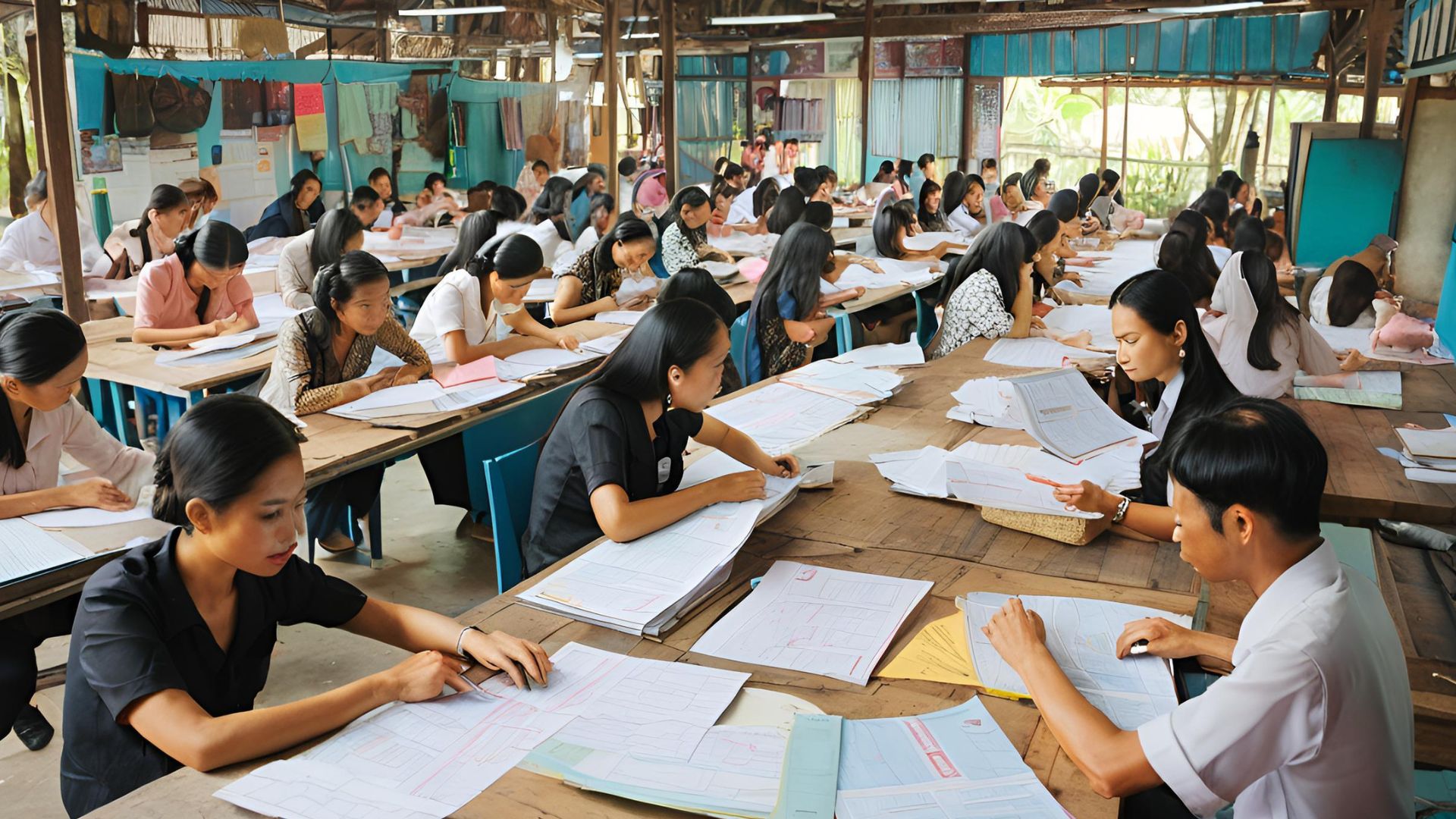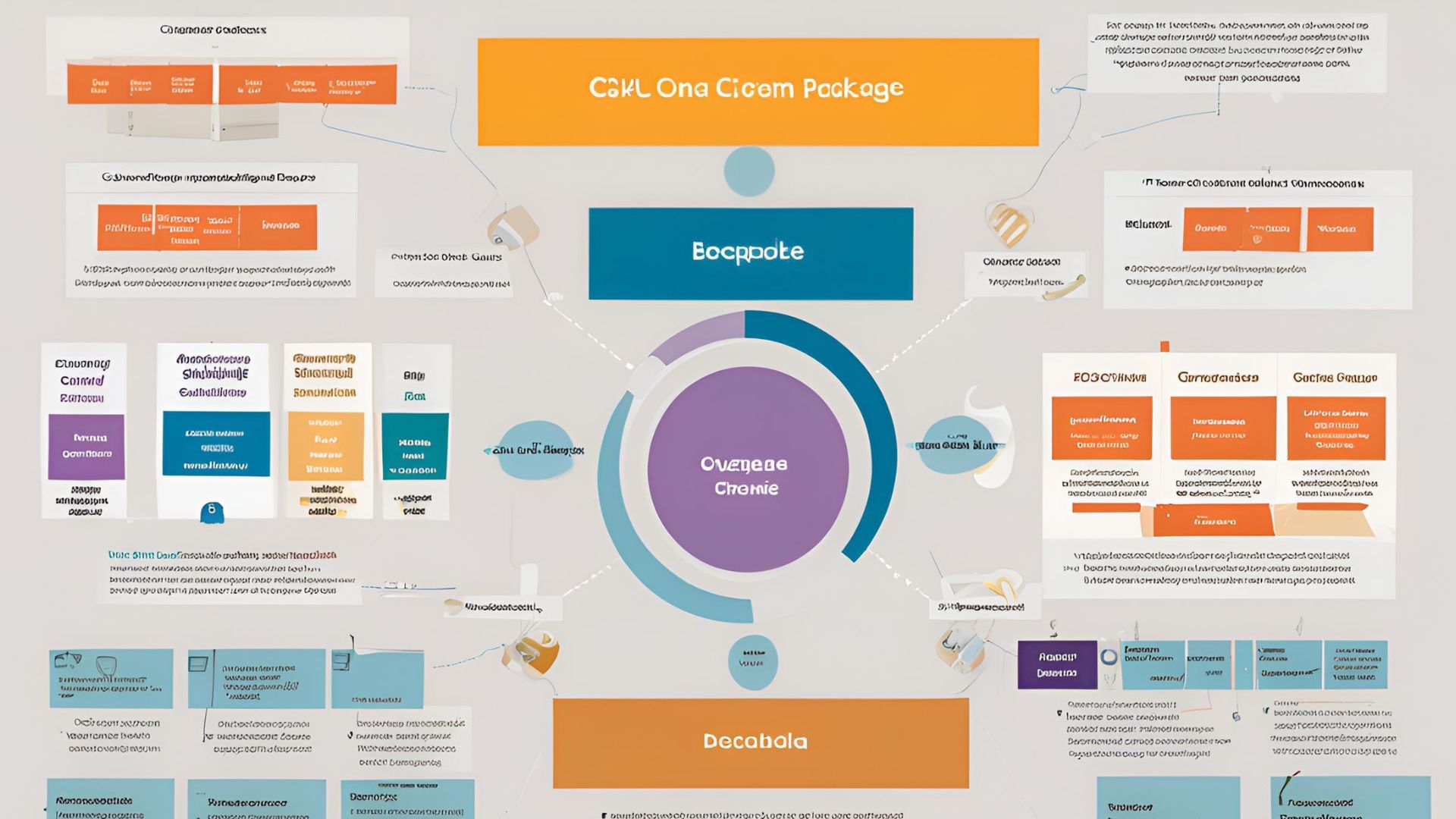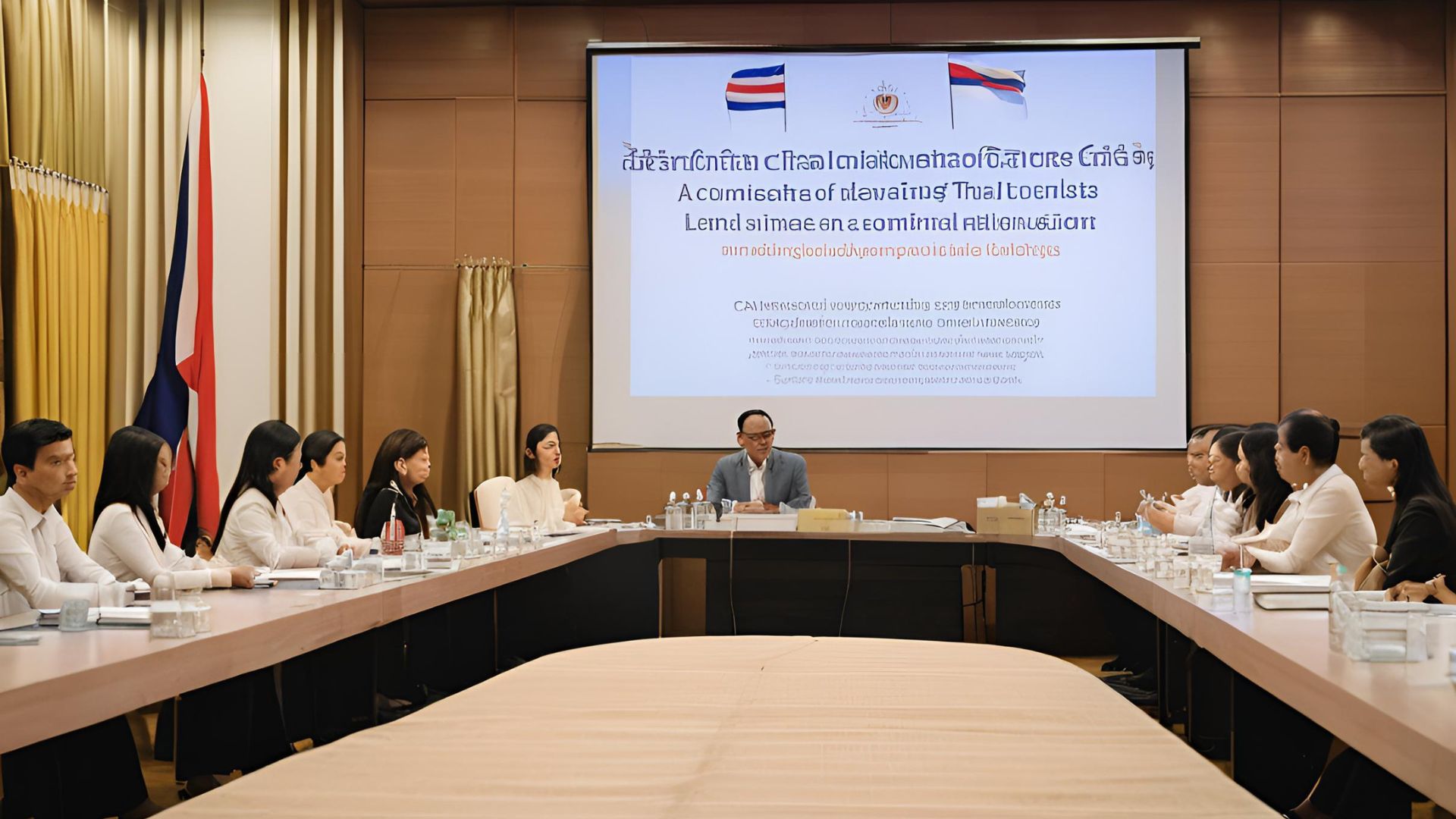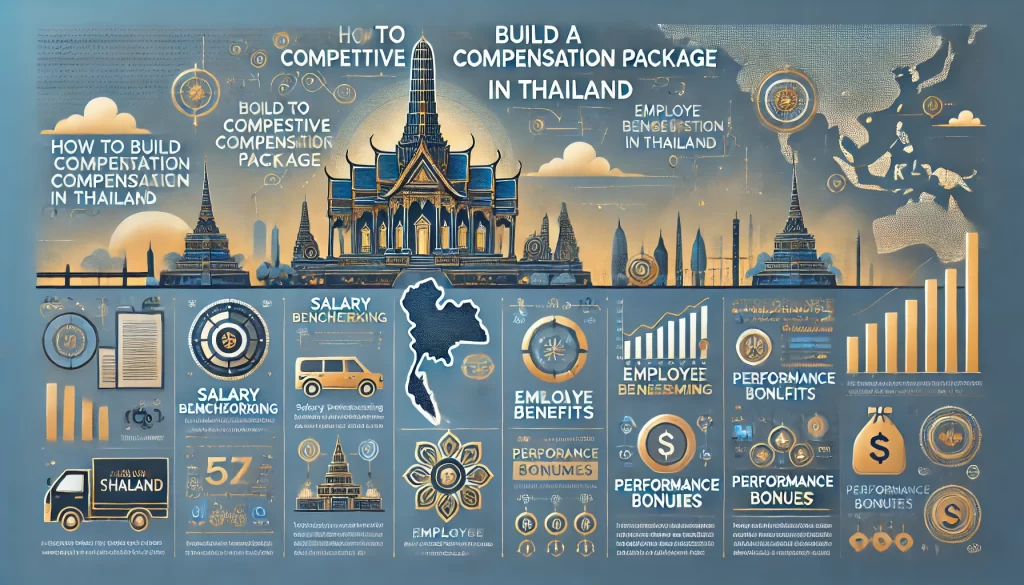In the bustling landscape of Thailand’s business world, one challenge looms large for employers: How do you attract and retain top talent in a competitive market? 🇹🇭💼 The answer lies in crafting a compensation package that not only meets industry standards but also resonates with the unique needs and values of Thai professionals.
Picture this: You’ve found the perfect candidate for a crucial role in your company. They’re skilled, experienced, and seem like an ideal cultural fit. But just as you’re about to make an offer, they’re snatched away by a competitor offering a more enticing compensation package. Sounds familiar? This scenario plays out all too often in Thailand’s dynamic job market, leaving employers scrambling to keep up.
In this comprehensive guide, we’ll dive deep into the art of building a competitive compensation package in Thailand. From understanding the intricacies of the local labor market to tailoring benefits that align with Thai culture, we’ll cover everything you need to know. We’ll explore the core components of an attractive package, navigate the legal landscape, and even uncover non-monetary benefits that can give you an edge. So, buckle up as we embark on this journey to master the complexities of Thai compensation and emerge with a strategy that will help you secure the best talent for your organization. 🚀💡
Understanding Thailand’s Labor Market

A. Key economic factors influencing compensation
Thailand’s labor market is shaped by several key economic factors that directly impact compensation strategies:
- Economic growth
- Inflation rates
- Foreign investment
- Skilled labor shortages
These factors contribute to the dynamic nature of compensation in Thailand. Let’s explore their influence in more detail:
| Factor | Impact on Compensation |
|---|---|
| Economic growth | Higher growth rates lead to increased demand for labor and upward pressure on wages |
| Inflation rates | Affects cost of living adjustments and real wage growth |
| Foreign investment | Brings competitive salary practices and can drive up wages in certain sectors |
| Skilled labor shortages | Results in premium pay for in-demand skills and expertise |
B. Industry-specific salary trends
Different industries in Thailand exhibit varying salary trends based on market demand and sector growth. Some key industries to consider include:
- Technology and IT
- Manufacturing
- Tourism and hospitality
- Finance and banking
Each of these sectors has unique compensation patterns influenced by factors such as:
- Global competition
- Technological advancements
- Government policies
- Supply and demand of skilled workers
C. Local vs. expatriate compensation differences
When building a competitive compensation package in Thailand, it’s crucial to understand the distinctions between local and expatriate compensation:
- Base salary: Typically higher for expatriates due to relocation and international experience
- Benefits: Often more comprehensive for expatriates, including housing allowances and international health insurance
- Tax considerations: Expatriates may require tax equalization or protection clauses
- Cultural allowances: Additional perks for expatriates to ease cultural transition
Companies must strike a balance between attracting international talent and fostering local workforce development. This often involves creating separate compensation structures for local and expatriate employees while ensuring fairness and transparency.
Core Components of a Competitive Package

Base salary benchmarking
To build a competitive compensation package in Thailand, it’s crucial to start with a solid foundation: the base salary. Benchmarking your base salaries against industry standards ensures you’re offering fair and attractive compensation. Here’s a breakdown of effective benchmarking strategies:
- Market research
- Job evaluation
- Salary surveys
- Competitor analysis
| Benchmarking Method | Description | Advantages |
|---|---|---|
| Market research | Analyze salary data from various sources | Broad market perspective |
| Job evaluation | Assess roles based on skills and responsibilities | Internal equity |
| Salary surveys | Participate in or purchase industry-specific surveys | Accurate, current data |
| Competitor analysis | Research salaries offered by direct competitors | Understand your market position |
Performance-based bonuses
Performance-based bonuses are a powerful tool to motivate employees and reward high achievers. In Thailand, these bonuses often play a significant role in total compensation. Consider the following bonus structures:
- Annual performance bonuses
- Project completion bonuses
- Sales commissions
- Profit-sharing plans
Health insurance and medical benefits
In Thailand, providing comprehensive health coverage is essential for attracting and retaining talent. A competitive package should include:
- Inpatient and outpatient coverage
- Dental and vision care
- Annual health check-ups
- Coverage for dependents
Retirement plans and provident funds
Offering retirement benefits demonstrates long-term commitment to employees’ well-being. In Thailand, provident funds are popular retirement savings vehicles. Key considerations include:
- Employer contribution matching
- Vesting schedules
- Investment options
- Financial education programs
By focusing on these core components, you’ll create a strong foundation for a competitive compensation package in Thailand. Next, we’ll explore how to tailor these benefits to align with Thai culture and values.
Tailoring Benefits to Thai Culture

Family-oriented perks
In Thai culture, family plays a crucial role. Tailoring benefits to accommodate this aspect can significantly enhance your compensation package. Consider offering:
- Extended parental leave
- Family health insurance coverage
- Childcare support or on-site facilities
- Flexible working hours for family commitments
These perks not only attract top talent but also foster loyalty among employees. A family-friendly workplace is highly valued in Thailand and can set your company apart from competitors.
| Family-Oriented Perk | Description | Impact |
|---|---|---|
| Extended parental leave | Beyond legal requirements | Supports work-life balance |
| Family health insurance | Covers spouse and children | Provides financial security |
| Childcare support | On-site or subsidized | Reduces stress for working parents |
| Flexible working hours | Accommodate family needs | Improves job satisfaction |
Work-life balance initiatives
Thai employees increasingly prioritize work-life balance. Implement initiatives that promote this balance:
- Remote work options
- Compressed workweek schedules
- Wellness programs (e.g., gym memberships, yoga classes)
- Paid time off for personal development or volunteering
These initiatives demonstrate your company’s commitment to employee well-being, which is highly appreciated in Thai culture.
Career development opportunities
Career growth is a strong motivator for Thai professionals. Offer robust development programs:
- Mentorship programs
- Skills training workshops
- Leadership development courses
- Cross-functional project opportunities
By investing in your employees’ growth, you not only improve their skills but also increase retention rates. This approach aligns well with the Thai value of continuous self-improvement.
Now that we’ve explored how to tailor benefits to Thai culture, let’s examine the legal considerations that must be taken into account when designing compensation packages in Thailand.
Legal Considerations in Thai Compensation

A. Minimum wage requirements
In Thailand, understanding and adhering to minimum wage requirements is crucial for businesses. The minimum wage varies by province, reflecting the different costs of living across the country. As of 2023, the daily minimum wage ranges from 328 to 354 baht, with Bangkok and surrounding provinces having the highest rates.
| Province | Daily Minimum Wage (Baht) |
|---|---|
| Bangkok | 354 |
| Phuket | 354 |
| Chonburi | 345 |
| Chiang Mai | 335 |
| Udon Thani | 328 |
Employers must ensure they’re paying at least the minimum wage for their specific location to avoid legal issues and maintain good employee relations.
B. Overtime and holiday pay regulations
Thai labor law stipulates specific rules for overtime and holiday pay:
- Overtime on regular workdays: At least 1.5 times the hourly wage rate
- Work on holidays: At least 2 times the hourly wage rate
- Overtime on holidays: At least 3 times the hourly wage rate
C. Social security contributions
Both employers and employees are required to contribute to Thailand’s social security system. The current contribution rates are:
- Employer: 5% of the employee’s salary (capped at 750 baht per month)
- Employee: 5% of their salary (capped at 750 baht per month)
These contributions cover various benefits, including:
- Injury or sickness benefits
- Maternity benefits
- Invalidity benefits
- Death benefits
- Child allowance
- Old-age pension
- Unemployment compensation
D. Termination and severance pay rules
When terminating employment, Thai law requires employers to provide severance pay based on the length of service:
- 120 days to 1 year: 30 days’ wages
- 1 to 3 years: 90 days’ wages
- 3 to 6 years: 180 days’ wages
- 6 to 10 years: 240 days’ wages
- 10 to 20 years: 300 days’ wages
- 20+ years: 400 days’ wages
Exceptions apply in cases of serious misconduct or voluntary resignation. Employers must also provide advance notice or payment in lieu of notice when terminating employment contracts.
Understanding these legal considerations is essential for creating a compliant and competitive compensation package in Thailand. Next, we’ll explore how non-monetary benefits can play a crucial role in attracting top talent in the Thai job market.
Attracting Top Talent with Non-Monetary Benefits

Flexible work arrangements
In Thailand’s competitive job market, offering flexible work arrangements can be a game-changer in attracting top talent. Remote work options, flexible hours, and compressed workweeks are increasingly popular among Thai professionals. Here’s a breakdown of common flexible work arrangements:
| Arrangement | Description | Benefits |
|---|---|---|
| Remote work | Employees can work from home or any location | Reduces commute time, increases work-life balance |
| Flexible hours | Employees choose their start and end times | Accommodates personal schedules, improves productivity |
| Compressed workweeks | Work longer hours for fewer days | Provides extended weekends, reduces burnout |
Professional training and education support
Investing in employees’ growth is crucial for attracting and retaining top talent. Consider offering:
- Tuition reimbursement for relevant courses
- In-house training programs
- Sponsorship for professional certifications
- Mentorship opportunities
Employee recognition programs
Acknowledging employee contributions is vital in Thai culture. Implement recognition programs such as:
- Monthly or quarterly “Employee of the Month” awards
- Peer-to-peer recognition platforms
- Performance-based bonuses or incentives
Company-sponsored social events
Thai culture values social connections and group harmony. Organize events that foster team bonding:
- Annual company retreats
- Team-building activities
- Cultural celebrations (e.g., Songkran water festival)
- Family days
By offering these non-monetary benefits, companies can create a more attractive work environment that appeals to Thai professionals seeking more than just financial compensation. This approach not only helps in attracting top talent but also contributes to higher employee satisfaction and retention rates.
Implementing a Fair and Transparent Compensation System

Developing clear job descriptions and pay grades
To implement a fair and transparent compensation system in Thailand, start by developing clear job descriptions and establishing well-defined pay grades. This foundation ensures employees understand their roles and potential earnings.
- Job Description Components:
- Job title
- Key responsibilities
- Required qualifications
- Performance expectations
- Reporting structure
- Pay Grade Structure:
- Entry-level
- Mid-level
- Senior-level
- Management
- Executive
| Pay Grade | Salary Range (THB/month) | Experience Level |
|---|---|---|
| Entry | 15,000 – 25,000 | 0-2 years |
| Mid | 25,000 – 50,000 | 3-5 years |
| Senior | 50,000 – 100,000 | 6-10 years |
| Management | 100,000 – 200,000 | 10+ years |
| Executive | 200,000+ | 15+ years |
Conducting regular salary reviews
Regular salary reviews are crucial for maintaining competitive compensation. Implement a structured review process to ensure fairness and consistency across the organization.
- Annual performance-based reviews
- Market rate assessments
- Inflation adjustments
- Promotion considerations
Communicating compensation policies effectively
Transparency in compensation policies fosters trust and motivation among employees. Develop a comprehensive communication strategy to ensure all staff members understand the company’s approach to compensation.
- Create an easily accessible compensation handbook
- Conduct training sessions on compensation policies
- Provide individual compensation statements
- Offer open forums for questions and feedback
By implementing these strategies, you’ll create a fair and transparent compensation system that attracts and retains top talent in Thailand’s competitive job market. This approach not only ensures compliance with local labor laws but also demonstrates your commitment to employee satisfaction and organizational success.
Addressing Challenges in Thai Compensation

Managing salary expectations
In Thailand’s dynamic job market, managing salary expectations can be challenging. Here’s a breakdown of key strategies:
- Conduct regular market research
- Communicate transparently with employees
- Implement a clear salary structure
- Offer performance-based incentives
| Strategy | Description | Benefit |
|---|---|---|
| Market research | Stay updated on industry salary trends | Ensures competitive offers |
| Transparent communication | Discuss salary structure openly | Builds trust and understanding |
| Clear salary structure | Define salary ranges for each role | Provides clarity and fairness |
| Performance incentives | Reward high performers | Motivates employees and justifies higher pay |
Balancing cost control with competitive offers
Striking a balance between cost control and competitive offers is crucial. Consider these approaches:
- Implement a total rewards strategy
- Offer flexible benefits packages
- Focus on high-impact, low-cost perks
- Leverage non-monetary benefits
Adapting to rapid market changes
Thailand’s job market can shift quickly. To stay agile:
- Regularly review and adjust compensation strategies
- Monitor industry disruptors and emerging trends
- Develop a flexible compensation framework
- Invest in workforce planning and skills development
Retaining key employees in a competitive market
Retention is vital in Thailand’s competitive landscape. Effective strategies include:
- Providing clear career progression paths
- Offering targeted retention bonuses
- Implementing mentorship programs
- Creating a positive work culture
By addressing these challenges proactively, companies can develop robust compensation strategies that attract and retain top talent in Thailand’s competitive job market.
Building a competitive compensation package in Thailand requires a deep understanding of the local labor market, cultural nuances, and legal landscape. By focusing on core components like salary, bonuses, and benefits while tailoring them to Thai culture, employers can create attractive packages that resonate with local talent. Implementing a fair and transparent compensation system, along with offering non-monetary benefits, can significantly enhance an organization’s ability to attract and retain top performers.
As the Thai job market continues to evolve, staying informed about industry trends and regularly reviewing compensation strategies is crucial. By addressing challenges proactively and maintaining flexibility in your approach, you can ensure your compensation packages remain competitive and aligned with both employee expectations and business objectives. Remember, a well-designed compensation strategy is not just about financial rewards—it’s about creating a holistic employee experience that fosters loyalty, motivation, and long-term success in the Thai business landscape.

